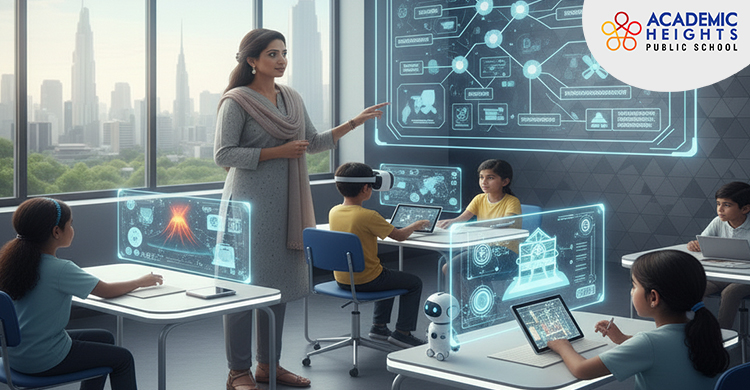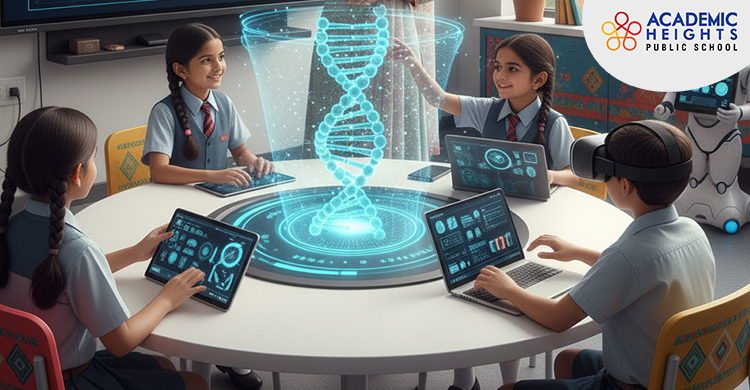In the digital age, the integration of artificial intelligence AI in education signifies a revolutionary change towards smart education. AI is changing conventional teaching methods by enabling real-time feedback, automating tests, and personalising study materials. It equips teachers and students with flexible resources that improve productivity, engagement, and results. Education expands boundaries as schools embrace AI-driven technologies, encouraging accessibility, creativity, and critical thinking. This change marks the beginning of a new era in which education is data-driven, dynamic, and prepared for the future.
What Does Smart Learning Mean?
Smart learning describes an AI-powered strategy that turns traditional ways of education into a tailored, engaging, and effective process. Smart learning adapts lessons to each student’s needs, monitors progress in real time. It also increases engagement by utilising technologies such as data analytics, intelligent tutoring systems, and adaptive learning platforms. In addition to enhancing learning outcomes, this method gives students the tools they need to succeed in the digital age.
How Technology is Transforming Education

The future of education is being shaped by advancements in artificial intelligence (AI), virtual classrooms, and interactive tools, which will make learning more engaging, accessible, and personalised for every student.
From Traditional Classrooms to Online Learning Platforms
Traditional classroom settings are giving way to online learning environments, which allow for more flexible and engaging study sessions. The fact that students can access lessons at any time, work together virtually, and study at their own pace demonstrates how technology is influencing education going forward.
Digital Tools Reshaping Student Experiences
Student experiences are being redefined by digital tools like interactive apps, virtual labs, and platforms driven by artificial intelligence. They increase the effectiveness and immersion of education by facilitating collaborative engagement, real-time feedback, and personalised learning. These developments will have a significant impact on how education develops in the future.
The Role of Artificial Intelligence in Education

Artificial Intelligence (AI) in education is transforming classrooms and helping teachers focus more on meaningful student engagement by automating tasks, customising learning paths, and providing insightful information.
- Personalised Learning Paths: By evaluating student performance, determining strengths and weaknesses, and modifying content appropriately, artificial intelligence in education produces individualised learning paths. This individualised approach ensures that each learner advances at their own ideal rate, promotes deeper understanding, and increases confidence.
- AI Tutors and Virtual Assistants: AI tutors and virtual assistants offer students personalised instruction, immediate clarification of questions, and round-the-clock assistance. They improve accessibility, engagement, and efficiency by accommodating different learning styles, which makes learning more dynamic and focused on the needs of the individual student.
- Smart Content and Interactive Lessons: By offering individualised materials, adaptive exercises, and immersive multimedia resources, artificial intelligence (AI) in education makes it possible to create intelligent content and interactive lessons. By actively involving students, simply explaining complex ideas, and enhancing memory retention, these resources make learning more dynamic, efficient, and learner-centred.
- 24/7 Learning Availability: AI in education makes learning possible outside of regular class times. Chatbots, adaptable platforms, and intelligent tutoring systems allow students to access materials, get answers to their questions, and practice topics at any time. This 24/7 accessibility promotes self-paced study, improves comprehension, and efficiently aids academic development.
- Enhanced Accessibility: By offering real-time language translation, adaptive tools for students with different needs, and personalised learning materials, artificial intelligence (AI) in education greatly improves accessibility. This promotes inclusivity and equitable opportunity in the digital classroom by ensuring that students with different backgrounds and skill levels may participate successfully.
Benefits of AI in Education
Artificial intelligence in schools enhances learning outcomes and creates a more effective and engaging student-centred environment. It does this through personalised teaching, automated administrative processes, and real-time feedback.
Enhancing Engagement and Retention: By providing interactive courses, adaptive tests, and gamified learning experiences, artificial intelligence AI in education improves student engagement and retention. Education becomes more immersive and memorable with the help of these technologies, which also efficiently reinforce topics, keep students engaged, and accommodate different learning styles.
Real-time Feedback and Assessment: AI makes it possible for continuous evaluation and real-time feedback, which helps students quickly pinpoint their areas of strength and growth. This individualised approach ensures that academic progress is tracked properly and efficiently, encourages fast learning, and assists teachers in customising education.
Supporting Inclusive Education: By providing individualised learning experiences for students with a range of needs and abilities, artificial intelligence in the classroom promotes inclusive education. Every student can engage completely and reach their learning potential with the use of tools like speech-to-text, adaptive learning systems, and personalised material.
AI-Driven Content Creation: I in education makes it possible to create dynamic, personalised learning resources that meet the needs of each unique learner. AI-driven content, such as interactive courses and automated tests, improves student engagement, saves teachers time, and ensures that learning is efficient and relevant.
Pros of Smart Learning with AI
Smart learning with AI improves online learning platforms by providing interactive experiences, adaptive evaluations, and personalised lessons. This makes education more efficient, engaging, and tailored to each student’s needs.
- Better Accessibility for All Learners: By offering individualised materials, adaptive tools, and support for a range of learning requirements, smart learning with AI ensures improved accessibility for all students. Students with different backgrounds and skill levels can participate fully in and excel on online learning platforms thanks to this inclusive approach.
- Professional Development for Teachers: Smart learning with AI promotes professional development by giving educators access to data-driven insights, individualised training programs, and cutting-edge teaching techniques. This gives teachers the ability to improve their abilities, adjust to new technology, and provide more efficient, student-centred instruction.
- AI Personalises Education Experiences: AI analyses each student’s performance and learning habits to personalise instruction. Through lesson adaptation, resource recommendations, and focused feedback, it makes learning more interesting, efficient, and individualised for each student while letting them advance at their own speed.
- Cost-Effective and Scalable Learning: By lowering dependence on physical resources and facilitating remote access, smart learning with AI increases the affordability and scalability of education. Multiple learners can be reached at once by online learning platforms, which effectively deliver high-quality education without sacrificing individualised learning experiences.
- Immersive & Interactive Learning Environments: Students actively engage with lessons in immersive, interactive environments created by smart learning with AI. Learning is made more interesting by virtual simulations, gamified exercises, and real-time feedback. These elements also improve comprehension of difficult ideas and promote teamwork and critical thinking.
Cons of AI in Education
AI has many advantages, but if it is used excessively, it may diminish human interaction and critical thinking, which raises issues with bias, equity, and data privacy—all of which are crucial for the future of education.
- Data Privacy and Security Concerns: Large volumes of student data are gathered by AI in education, which raises privacy and security concerns. Strong protections are necessary to protect students and preserve the integrity of education in the future because unauthorised access or misuse of this data can undermine trust.
- Reduced Human Interaction: Growing AI use may reduce in-person interactions between educators and learners, which could have an impact on emotional support, mentoring, and social skills. An over-reliance on technology could make learning more solitary and hinder the holistic advancement of education in the future.
- Over-Reliance on Technology: An over-reliance on AI in the classroom may hinder students’ ability to think critically and solve problems. It can also lead to less human interaction, which could make learning less individualised and possibly increase knowledge gaps. This could be problematic for a balanced educational future.
- High Implementation Costs: A large financial outlay for software, hardware, and training is frequently required when integrating AI in the classroom. Many schools may find their access restricted by these high implementation costs. This creates inequalities and makes it more difficult to achieve an inclusive and equitable educational future.
- Risk of Academic Dishonesty: Since students can misuse AI tools to finish assignments or tests, AI in education may unintentionally encourage academic dishonesty. In order to preserve integrity and responsibly shape the future of education, this challenge calls for close observation, adherence to moral principles, and teacher intervention.
Conclusion:-
AI in education is changing education by making it more efficient, personalised, and interesting. Even though challenges like academic dishonesty and data privacy exist, the benefits are significant. Immersive experiences, adaptive learning, and improved accessibility far outweigh the disadvantages. By carefully and ethically integrating AI, educators can create a future-ready environment that empowers students and fosters innovation. This approach ensures that education adapts to the digital age while also helping students develop critical real-world skills. To find out more, read our blog post on How Schools Help Students Develop Real-World Skills Beyond Academics to learn more.
